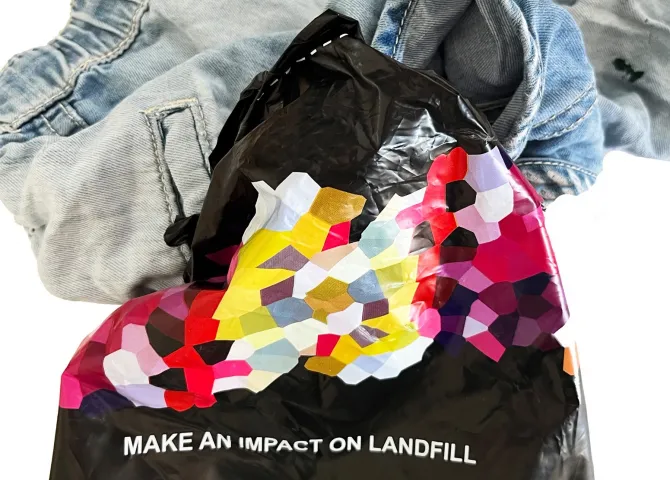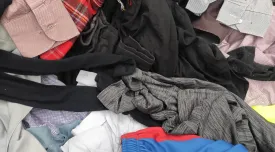Breadcrumb
- Home
- Melbourne Stories
- Responsible and easy solution for your old clothes; RCYCL
Responsible and easy solution for your old clothes; RCYCL
RCYCL provides a ‘direct to consumer’ solution that enables the everyday person to access a recycling service satchel so users can be responsible for their ‘end of life’ clothing. RCYCL is on the cusp of launching a ‘never before seen’ secondary product offer in partnership with Salvos Stores nationally – GIVE BACK by RCYCL. This aims to encourage responsible donating and help charities deal with the clothing waste that currently overwhelms them.

Why Melbourne?
Being in the fashion and retail game for over 25 years, I have had the luxury of travelling all over the world for work. When I come back, I’m instantly reminded why Melbourne is my home. It’s a social city that buys into good ideas and is generous about supporting businesses that think outside the box.
– RCYCL founder, Belinda Paul
Challenge
When it comes to climate transgressions, the global fashion industry has amassed a long list of alarming statistics. Here’s just a few. The industry is responsible for 10 per cent of humanity’s carbon emissions – more carbon than international flights and maritime shipping combined. A single t-shirt takes more water to make (2,700 litres) than the person wearing it would drink in three years.
On average, Australians buy 56 new items of clothing every year. Older garments inevitably get discarded. In Australia, 210,000 tonnes of clothing and textiles end up in landfill every year.
“Improved affordability of clothes is a good thing. Parents shouldn’t have to choose between a new pair of school shoes and paying the electricity bill. But this big shift in the industry was accompanied by a surge in thoughtless design and material selection and driven by a business model that encouraged a throwaway shopping culture.”
Solution
In 2021, experienced fashion industry professional, Belinda Paul, hit on a way to help Australians develop better fashion consuming habits. She created RCYCL, a three-step solution to help people dispose of clothing not good enough to reuse.
Consumers buy RCYCL’s compostable return satchels from retailers, fill them with clothes not fit for second hand resale and conveniently send them back using Hubbed. RCYCL’s recycling partners then use their supply chain to sort the garments by fibre, then shred and spin them into yarn to be woven into new fabric in India, the hub of textile manufacturing.
Additional to the fabric repurposing, two aspects set this service apart; the convenience of Hubbed drop off points located locally all over Melbourne and that RCYCL’s return satchels must be purchased. A cost that is passed on to the consumer until the industry and government catch up.
If something is too hard people don’t invest in it. But if a service is entirely free people don’t value it. RCYCL is therefore a deliberate fee-for-service model so consumers are more inclined to appreciate it enough to get into the habit of decluttering regularly, habitually and often.
The idea behind RCYCL is to be aware of the value chain you become part of as a consumer. Consuming is so embedded in our society we’re not going to suddenly stop. Clothes are central to our identity. They are an expression of our need to be social and fit in. RCYCL’s cleverness is that it doesn’t try to shame people into not buying clothes. Instead, it offers a sharp looking brand that fashion-conscious people want to engage with. This, in turn, encourages people to close the loop they became part of as consumers.
Result
A natural reaction to an overwhelming problem like climate change is to do nothing. RCYCL gives everyone a way to do something that is easy, familiar and offers a similar dopamine rush to shopping.
Understandably, RCYCL made an immediate impression on the fashion industry. In 2023, RCYCL won the City of Melbourne Sustainability Award and was a runner up in eBay’s Circular Fashion Fund in recognition of its prospective capacity to help scale and develop the circular fashion economy. In the same year, Belinda was asked to partner with Mirvac on a successful national campaign that offered bulk textile recycling in its shopping centres bringing the service directly to the consumer within the retail environment.
The success of RCYCL prompted a secondary product offer called GIVE BACK by rcycl. Provided in partnership with Salvos Stores nationally, GIVE BACK by rcycl aims to encourage more responsible donating. Of all the stuff you see overflowing from charity bins, only about 16% is good enough to be sold. GIVE BACK by rcycl aims to increase that percentage by prompting people to think about what they’re giving rather than mindlessly making their junk someone else’s problem.





